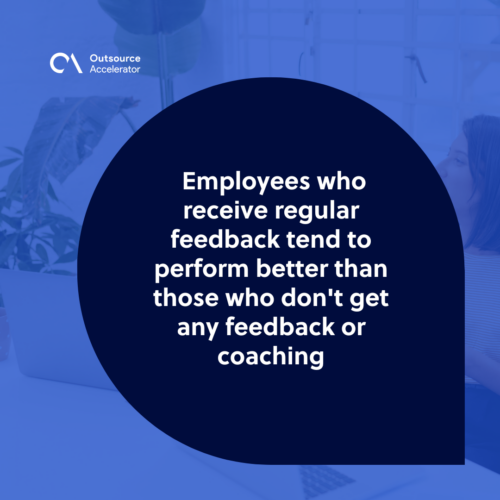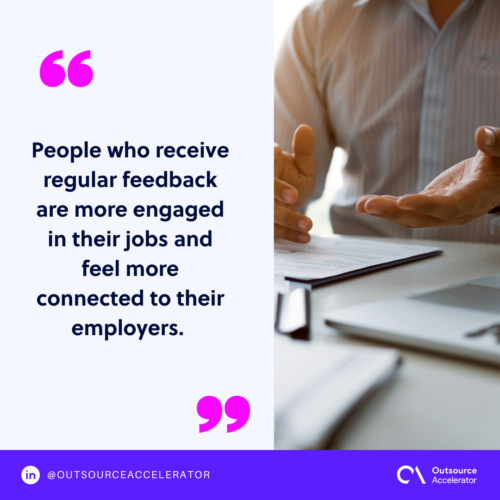Why is feedback important? 10 benefits in the workplace

Feedback is vital to personal and professional growth.
Whether you’re looking to improve your job performance, build stronger relationships, or simply grow as an individual, feedback can provide valuable insights. It helps you identify areas of improvement.
Although feedback may not always be easy to receive, it fosters growth and success.
In this article, we’ll explore why feedback is so important and how it can help you achieve your goals in life and at work.
10 benefits of feedback
Feedback in the workplace is essential for fostering a positive and productive environment.
Benefits of giving feedback
Here are the benefits of giving feedback in a professional setting:
1. Enhanced communication
By giving feedback, you’re communicating with your coworkers. It lets them know:
- How they’re doing
- How they can improve their performance
- What they need to do to get there
It also shows them that you’re concerned about their success. This helps with overall team productivity and allows all team members to feel involved in the company, which increases job satisfaction.
2. Employee development
One of the primary reasons people give feedback is because they want their employees to develop new skills or improve on existing ones. Employees who receive regular feedback tend to perform better than those who don’t get any feedback or coaching.
By giving your employees regular feedback, you’ll be able to help them develop their skills to better handle whatever challenges come their way at work.

3. Motivation and morale
Giving feedback helps motivate employees by letting them understand how they perform in their roles. This helps improve morale because they know where they stand in relation to what is expected of them.
4. Goal alignment
When you give someone feedback, you’re helping them align with your goal or objective. This gives them a clear path forward and helps them understand what they must do to achieve desired outcomes.
When both parties are on the same page regarding goals and expectations for success, this helps with goal setting and productivity.
5. Conflict resolution
When you don’t give constructive feedback and instead just let issues go unresolved, conflict will likely arise later. You’ll have less control over the situation if an argument’s already been made.
Giving feedback on their performance allows both parties to discuss things openly and honestly. This lets them see where they stand and what they must do to improve.
Benefits of receiving feedback
Employees receiving feedback gives them the opportunity for:
6. Self-improvement
Use feedback as an opportunity to develop yourself in new ways. Feedback can inspire you to make changes and improve your skills in areas where you might not have been aware of weaknesses or shortcomings.
Feedback is essential for self-improvement in the workplace. It helps you grow and develop as an employee by showing you where your strengths and weaknesses lie so you can work on them.
This creates a better working environment for everyone.
7. Skill development
Feedback helps employees improve their skills. They can identify their strengths and weaknesses, which they can then use to improve their performance for long-term professional development.
It can lead to increased job satisfaction and increased productivity.
8. Performance recognition
Remember that feedback can also come as praise. Performance recognition is one of the most important benefits of receiving feedback in the workplace.
It’s not just about getting a pat on the back for doing a good job. It’s about knowing what you’re doing well and how your performance can be improved.
9. Employee engagement
Employee engagement is the emotional commitment of employees to their organizations. It is a key driver of employee performance and has been shown to impact organizational culture, productivity, and profitability positively.
People who receive regular feedback are more engaged in their jobs and feel more connected to their employers. There’s a higher likelihood that they’ll stay in the business.

10. Team collaboration
Feedback helps teams collaborate better. A team that openly talks about its strengths and weaknesses is more likely to work together as a cohesive unit than one that doesn’t share openly with each other.
When employees feel supported by their managers, they are more likely to trust and work collaboratively with them.
How to provide constructive feedback
Providing constructive feedback is essential for fostering growth and improvement in others. It can inspire positive change and promote a supportive and collaborative work environment when delivered effectively.
Here are some steps on how to provide constructive feedback:
Prepare in advance
Before you sit down with your colleague, take a moment to think about what you want to say and how you want to say it. The more prepared you are, the less likely you’ll be nervous about the conversation or unsure how to approach it.
Ensure you’ve fully considered what you want and how best to say it. Think about what you’re hoping to accomplish, why this person matters, what they’ve done well in the past, and what could use improvement.
Be specific and objective
Be specific and objective. Be as specific as possible about what goes into your evaluation of someone’s work.
Point out specific behaviors that improve or hold back an employee’s performance. This will make it easier for them to understand exactly what they need to do better next time.
It’s important that when you provide feedback, you remain objective and don’t bring in personal feelings or opinions about the other person’s character. Stick to facts about their performance or behavior rather than making assumptions.
Offer actionable suggestions
One way to ensure your feedback is taken seriously is by offering suggestions for improvement rather than just criticizing someone’s work. Instead of saying, “This report isn’t good enough,” tell them what they could do differently.
Asking someone to improve their performance without helping them understand what they need to do is frustrating for employees. They won’t know where to start or if there is anything they can do differently.
So when you provide constructive criticism, also offer suggestions on how they can improve their performance.
Set clear expectations
When employees understand what they need to accomplish, they’re more likely to succeed. They also know when they’ve hit or fallen short of their targets.
When giving feedback, it’s important that both parties clearly understand what is expected of them.
Set aside time for one-on-one conversations about performance goals, metrics, and progress toward those goals. Don’t wait until an employee has already failed; this will only worsen matters when you have the conversation.

Maintain confidentiality
You should never share confidential information with anyone outside of your team without obtaining permission from the other person. This includes any information about their work performance, complaints, and disciplinary actions taken against them.
Unless the issue involves safety or security, give feedback in private. It’s important for employees to feel comfortable when receiving criticism, so make sure that you have their undivided attention before starting your conversation.
Remember to focus constructive feedback on helping the individual grow and improve. Approach the conversation with a genuine desire to support their development and contribute to their success.
By providing constructive feedback effectively, you can foster a culture of continuous improvement and create a positive and thriving work environment.







 Independent
Independent




